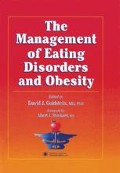Abstract
Our program is divided into seven phases. Phase one is the free orientation visit and phase 2 includes the nutritional assessment by the dietitian. Phase 3 is the doctor’ s physical examination and evaluation for the very-low-calorie diet treatment. Phase 4 is the active weight-loss phase and can be time limited or open ended. If this phase is time limited, then the patient may choose to follow the very low-calorie diet for 12 or 16 wk and then begin transition. If a patient chooses an open-ended program, then the patient may follow the regimen until the desirable or healthy weight is reached. Phase 5 is refeeding or transition back to a regular low-calorie maintenance diet. In this phase, the patient can choose to enter a research protocol utilizing combination antiobesity medications which would continue throughout the final phase of the program. Phase 6 is lifestyle modification of maintenance. Phase 7 is long-term intervention which can continue for many years according to the needs of the patient. (Table 1)
Access this chapter
Tax calculation will be finalised at checkout
Purchases are for personal use only
Preview
Unable to display preview. Download preview PDF.
References
Bistrian BR, Flatt JP, Winterer J, Cochran D, Young V. Protein requirements for net anabolism with hypocaloric diet. Clin Res 1975;23: 315A.
Wadden T, Kuehnel R. Very-low-calorie diet: reappraisal and recommendations. Weight Control Dig 1993;3: 265.
Weintraub M, Long-term weight control: The National Heart, Lung and Blood Institute, funded multimodal intervention study. Clin Pharmacal Ther 1992;51(5): 581–646.
ADA. Exchange lists for weight management. American Diabetes Association and American Dietetic Association, Washington, DC, 1995.
Hovell MF, Koch A, Hofstelter CR, Sipan C, Foucher P, et al. Long-term weight loss maintenance: assessment of a behavioral and supplemented fasting program regimen, Am J Public Health 1988;78(6): 663–666.
Kanders BS, Blackburn GL, Lavin P, Norten D. Weight loss outcome and health benefits associated with the Optifast program in the treatment of obesity. Int J Obes 1989;13(Suppl 2): 131–134.
Wadden TA, Foster GD, Letizia KA, Stunkard AJ. A multicenter evaluation of a proprietary weight reduction program for the treatment of marked obesity. Arch Intern Med 1992;152: 961–966.
Heuberger RA, Loper J, Baltes EJ, Lutes R, May RK, Broyles JT, et al. VLCD followed by combination obesity drugs: results at one year. Obes Res 1995;3(Suppl): 405s.
American College of Sports Medicine. ACSM’s Guidelines for Exercise Testing and Prescription. 4th ed. Williams & Wilkins, Baltimore, MD, 1995.
Friedman MA, Brownell KD. Psychological correlates of obesity: moving to the next research generation. Psychol Bull 1995; 117: 3–20.
O’Neil PM, Jarrell MP. Psychological aspects of obesity and dieting. In: Wadden TA, T B VanItallie TB, eds. Treatment of the Seriously Obese Patient. Guilford, New York, NY, 1992.
Stunkard AJ, Rush J. Dieting and depression reexamined: a critical review of reports of untoward responses during weight reduction for obesity. Annals of Internal Medicine 1974; 81, 526–533.
Williamson DA, O’Neil PM. Behavioral and psychological correlates of obesity. In: Bray G, Bouchard C, eds. Handbook of Obesity. Dekker, New York, 1998.
Editor information
Editors and Affiliations
Rights and permissions
Copyright information
© 1999 Springer Science+Business Media New York
About this chapter
Cite this chapter
Loper, J., Lutes, R.A., O’Neil, P.M. (1999). Obesity Treatment. In: Goldstein, D.J. (eds) The Management of Eating Disorders and Obesity. Nutrition ◊ and ◊ Health. Humana Press, Totowa, NJ. https://doi.org/10.1007/978-1-59259-694-2_21
Download citation
DOI: https://doi.org/10.1007/978-1-59259-694-2_21
Publisher Name: Humana Press, Totowa, NJ
Print ISBN: 978-1-4757-6761-2
Online ISBN: 978-1-59259-694-2
eBook Packages: Springer Book Archive

